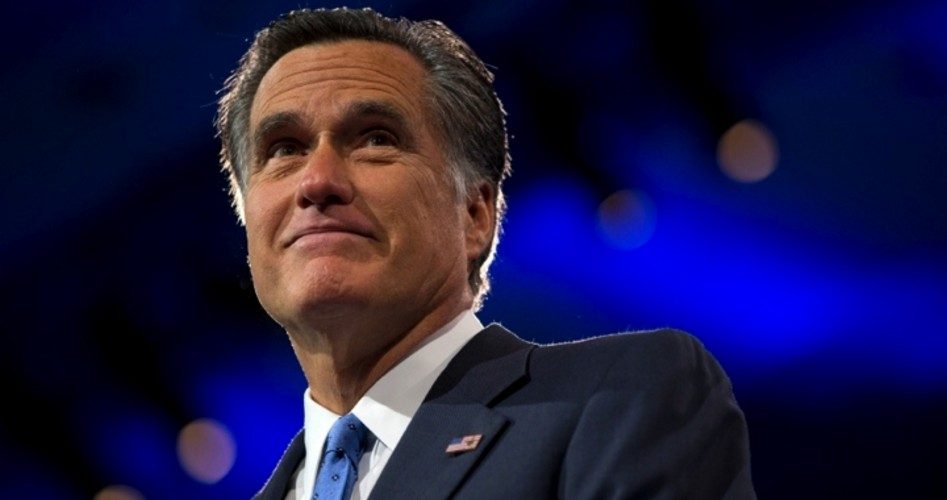
It’s official: If former Massachusetts governor Mitt Romney had been elected president in 2012, ObamaCare would still be with us, albeit in slightly modified form. Last year’s Republican presidential nominee told NBC’s David Gregory that as president, he too would have demanded that all Americans have health insurance; but unlike President Barack Obama, he would have ordered the states, rather than the federal government, to figure out how to make that happen.
Gregory began the November 3 edition of Meet the Press with a clip from a recent speech in which Obama praised Romney for doing “the right thing on healthcare” when he signed the 2006 legislation mandating that all Bay Staters have insurance. That law, of course, became the prototype for ObamaCare. In crafting the federal law, the Obama administration even consulted some of Romney’s former advisors.
Gregory then asked Romney why he “reject[ed]” Obama’s “compliment” — a good question considering that while he was still running for president and ObamaCare hadn’t begun visibly imploding, Romney said he took it as a “compliment” that Obama had called him “the grandfather of ObamaCare.” Today, with Healthcare.gov barely functioning, insurance rates skyrocketing, and insurance policies being canceled left and right, Romney wants nothing to do with his “grandchild.”
“I think the president failed to learn the lessons that came from the experience of Massachusetts,” Romney said. “First of all, the Massachusetts experience was a state-run plan. The right way to deal with health care reform is not to have a one-size-fits-all plan that’s imposed on all the states, but recognizing the differences between different states’ populations, states should be able to craft their own plans to get all their citizens insured, and to make sure that preexisting conditions are covered.”
Romney also pointed out that Massachusetts “phased in the requirements” of its healthcare law over time to prevent major problems like the ones ObamaCare is experiencing, and he chastised Obama for telling Americans that they could keep their health insurance if they liked it. “I think that fundamental dishonesty has really put in peril the whole foundation of his second term,” he asserted.
Clearly, the fact that Obama was not forthright about his healthcare plan’s effects on people’s existing insurance policies was the main talking point Romney wanted to get across in this appearance. He kept returning to it every time Gregory tried to point out the similarities between Romneycare and ObamaCare.
Romney admitted that his healthcare law had cost many Bay State residents their insurance and suggested that Obama had to have known the same thing would happen under ObamaCare but kept it from the public — as indeed he did. He also confessed that “health insurance is more expensive in Massachusetts than anywhere else in the country” and attributed that, at least in part, to Romneycare — something he was loath to do prior to last November. “And you’re going to see, as a result of ObamaCare, premiums going up dramatically across the country,” he added. That, too, is already occurring.
Despite all these negatives — not to mention the fact that Romneycare has caused such high healthcare costs in Massachusetts that the state has imposed price controls on healthcare — Romney still stands by his law as the right plan for Massachusetts, and possibly for the rest of the country. For all his paeans to federalism, Romney has long said the Massachusetts law should be a “model for the nation.”
In 2007, as Gregory reminded him by playing the tape of his appearance, Romney said, “I think you’re going to find, when it’s all said and done, after all these states that are laboratories of democracy get their chance to try their own plans, that those who follow the path that we pursued will find it’s the best path, and we’ll end up with a nation that’s taken a mandate approach.”
“You don’t believe all the states should have adopted this, but you do believe that the entire nation should take a mandate approach,” Gregory said. “If it was good for Massachusetts, what’s so wrong with taking it national?”
The obvious answer, that a federal plan similar to Massachusetts’ is unconstitutional, did not escape Romney’s lips, but he did again say that “each state should be able … to put in place the plan that works best for them.”
This at least sounds like a man who understands that the federal government has no business dictating healthcare policy to the states. Based on his answer to a subsequent question, however, that is clearly not the case.
“What would you have done?” Gregory asked. “Had you become president — in my interview with you in the course of the campaign you said there were aspects of ObamaCare that you would want to keep, preexisting conditions, et cetera. What would you have done?”
“Well, I’m not president so I can’t be so clear minded as to tell you what I would have done,” Romney replied. “But my own plan was to say to each state, ‘You’ve got a requirement to move to a point where all your people are insured, and where you cover preexisting conditions. We’re going to give you flexibility from the federal government level to help you be able to do so.’”
In other words, a President Romney would have sought to replace ObamaCare with ObamaCare Lite: a law enshrining the same faulty premises and mandates as ObamaCare with a thin veneer of federalism. This, of course, is no more constitutional than ObamaCare, and its effects would be roughly the same. After all, as Romney pointed out, ObamaCare’s failings are the same as those of Romneycare; and by requiring states to enact some variant of Romneycare, he would have ensured that those failings were replicated in each state just as surely as Obama has.
Anyone voting for Romney last year in hopes of ridding the country of ObamaCare got snookered.
Photo of former Massachusetts Governor Mitt Romney: AP Images


